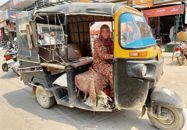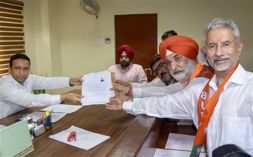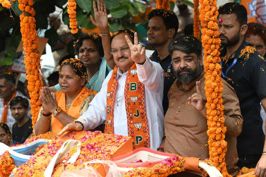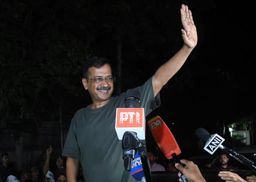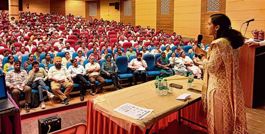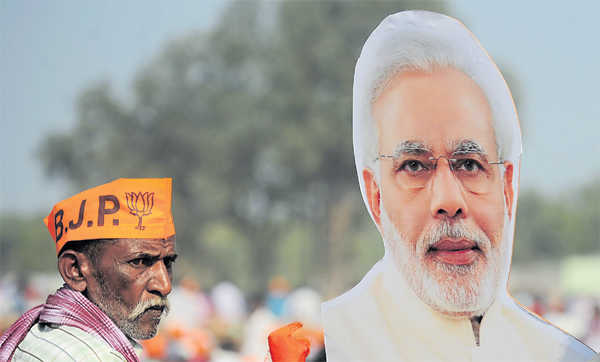
Unputdownable: Modi’s popularity has survived many blunders.
Yogendra Yadav
A SPECTRE is haunting liberal India, the spectre of Narendra Modi. Over the last three years, Modi has grown in stature, power and reach. His opponents are constantly fighting and losing battles. They cannot dodge him or duck him. And he emerges stronger from almost every battle.
The outcome of the recently concluded Assembly elections is a conclusive proof of the continuing charms of Mr Modi. There were doubts in between; his victory march after the 2014 Lok Sabha elections was halted first in Delhi, and then in Bihar. Both these setbacks to Mr Modi created the illusion that his ascendance was circumstantial and that it was based on Opposition's disunity. The BJP’s penetration from Kerala to Manipur and the defeat of the SP-Congress coalition puts paid to that illusion. The fond hope that Mr Modi will do himself in has also vanished.
Faced with this phenomenon, the Opposition responds in the only way they know to respond: they resort to anti-Modiism. This takes many forms. Sometimes, they hope that the Modi bubble will burst on its own, as he begins to make mistakes and the negative fallouts of his mistakes begin to accumulate. They target him personally in the hope that the moral veneer will come off, or they try to bring all anti-Modi forces together in order to defeat him. None of these seems to be working. Anti-Modi politics appears in the public eyes as just that — anti Modi.
It is not that he has not made mistakes. Poorly designed and shoddily executed demonetisation was as big a mistake as any Prime Minister could commit. It caused incalculable and avoidable misery to a vast population. Yet Mr Modi’s popularity survived this blunder. If anything, he may have used this disaster to enhance his reputation as a friend of the poor. Similarly, his flip-flop and misadventures with Pakistan have made our borders and security forces more vulnerable. Yet the public continues to see him as defender of national security. His government has done pretty little to address rural distress, made worse by consecutive droughts. He leads arguably the most anti-farmer government in the history of Independent India. Yet his party scores one victory after another among the rural electorate. His government’s highly publicised initiatives like Swachh Bharat Mission and Make in India have very little outcomes to show. Yet people give him credit for these initiatives. His mistakes do not become his political liability.
Any attempt to target him personally has not clicked with the public. It is not that there is nothing to target him about. The Birla-Sahara papers are the strongest evidence of political corruption against any Prime Minister so far. The famous Nagarwala case against Indira Gandhi was shrouded in mystery and did not yield any public evidence linking Nagarwala to her. The Bofors case did produce a paper trail of payments to middlemen. But the trail stopped well short of Rajiv Gandhi himself. Birla-Sahara case papers mark the first time that there is a direct documentary evidence of political payments made to a Prime Minister. Yet the court was unmoved, the media remained reluctant and the public not quite convinced. The same is true of the Rafale deal and the allegations of huge favours to one of the Ambani brothers. The manner in which questions regarding Mr Modi’s educational qualifications have been hushed up raise many uncomfortable questions. But not many are willing to ask those questions in the public domain. Any attempt to target Mr Modi rebounds on the Opposition.
Old tactics of caste coalitions don't work against him. Mr Amit Shah has perfected the art of creating counter-coalitions to outwit the Yadav-Muslim combine of the Samajwadi Party and Dalit mobilisation of the BSP. As in 2014, the BJP mobilised lower OBCs and Mahadalits along with its traditional upper caste base. Mr Modi provided that extra zing to this caste coalition. If the strategy of caste coalition did not work against Mr Modi in UP, it is unlikely to work anywhere else.
In desperation, the Opposition has taken to a grand alliance strategy. This is likely to be the principal oppositional strategy in the runup to 2019. Some senior Congress leaders have already started demanding a national ‘mahagathbandhan’ of all non-BJP parties. One cannot rule out an alliance between the SP and the BSP, at least for the purposes of the Lok Sabha election. Threatened by the rise of the BJP in Odisha, Neveen Patnaik may also wish to tie up with the Congress. Mamata Banerjee has been trying for a coalition, excluding the Left. Feeling an electoral extinction, the Left may be inclined to go with such a coalition. The RJD-JDU coalition has survived so far. Mr Nitish Kumar may well be the consensus face for a national grand alliance against the BJP.
It is too early to forecast the electoral prospects of such a coalition. Yet it may be relevant to remember the case of 1971. Faced with the rising popularity of Indira Gandhi, the entire Opposition — Jan Sangh, Socialist parties, Congress-O and BKD — came together in a Grand Alliance. The election resulted in a grand victory not for the alliance, but for Indira Gandhi’s Congress. She used a simple line to crush her opponents, ‘Ye kehte hain Indira hatao, main kehti hun garibi hatao’ (They say remove Indira, I say remove poverty). Mr Modi has already hinted at something similar. It is quite possible that such an alliance might shift popular sympathy towards him. Adept at playing the victim, Mr Modi could come up with a similar one-liner. The results may not be very different.
In this context, it is evident that the success of the RJD-JDU ‘mahagathbandhan’ in Bihar sent a false signal. We tend to forget that the first and the second largest parties came together in Bihar to defeat the party placed at the third rung. That scenario is unlikely to be repeated elsewhere. A rag-tag coalition of all non-BJP parties gathered solely for the purpose of defeating Mr Modi is unlikely to enthuse the Indian electorate.
It is time for oppositional politics to stop living in denial. Mr Modi’s ascendance cannot be countered by anti-Modiism. Narendra Modi is not just a person, he represents ordinary voters’ desire for a strong and decisive leader, pride in one’s own culture and aspirations for material well-being. He stepped into a vacuum created by the Congress and other parties in the Opposition. There is no way to counter Mr Modi without filling this vacuum with new principles and fresh energy. That seems to be a big task for the established opposition parties.






